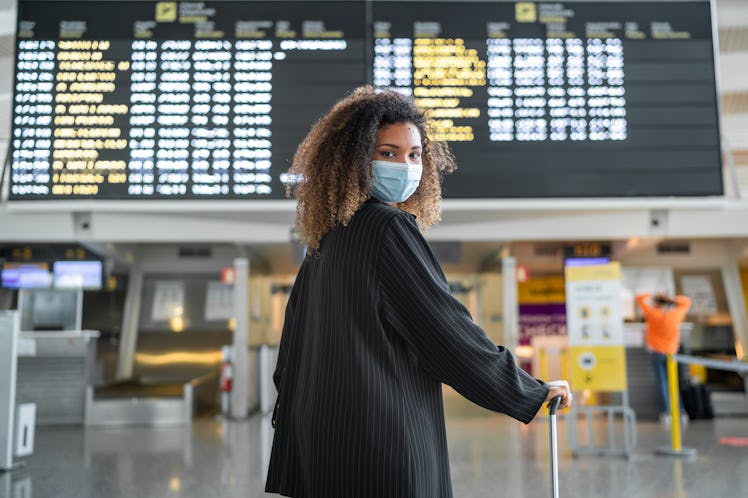
If You Have To Travel For The Holidays, This Is When You Should Get A COVID-19 Test
Thanksgiving is coming up on Thursday, Nov. 26, and you may be counting down the days until you hop on the plane to see friends and family, but with the coronavirus pandemic showing no signs of slowing down, you could put others at risk if you travel outside of your community. According to experts, it's best to keep celebrations virtual this year. But if you plan on traveling, here’s when you should get tested for COVID before Thanksgiving travel.
As of Thursday, Nov. 12, the number of COVID-19 cases in the United States is consistently rising. According to The New York Times, the United States reported 163,402 new COVID-19 cases on Nov. 12, which as of publication is the highest one-day record since the beginning of the pandemic. So while you may want to travel for Thanksgiving, you might want to reconsider, especially if you're traveling somewhere with an increased number of COVID-19 cases.
According to the U.S. Centers for Disease Control and Prevention (CDC) recommendations as of Oct. 21, It’s best to stay home to prevent contracting or spread of the novel coronavirus, and you can keep up with the latest travel and holiday guidance on the CDC website.
If you do choose to travel, you should get tested for COVID-19 before your trip. Rachael Piltch-Loeb, Ph.D., a preparedness fellow at Harvard University's T.H. Chan School of Public Health, tells Elite Daily, “In an ideal world if you are taking mass transit, you would want to test negative before traveling and after you arrive,” says Loeb. “If you are taking your own private transit (i.e. driving your own car), then testing only once makes sense.”
Knowing when to take the test is key. "Most people show symptoms of the virus within five days," says Piltch-Loeb. She suggests people self-isolate for at least five days right before their trip, and then get tested on the third day of that self-imposed quarantine. If you test positive for COVID-19, you should contact your doctor and follow the CDC’s guidance on quarantining.
If you get a negative result, you should continue quarantining until your trip, take your trip, and then isolate again after you arrive. After arrive at your destination, Piltch-Loeb says you should "self-isolate, then [test negative] before interacting with others."
When quarantining after you arrive, remember to follow the state’s guidelines for quarantining after travel, as well as your state's guidelines for when you return. Dr. Amesh Adalja, M.D., FIDSA, senior scholar at the Johns Hopkins Center for Health Security, spoke about travel risks during a Nov. 12 Bloomberg School of Public Health webinar on Thanksgiving celebrations and travel during the pandemic, including the difficulty of keeping up with different state restrictions. "When you're traveling to states where there's high prevalence [of COVID-19], it's always going to be a risky and a logistical nightmare to make sure you're in compliance on both sides of the border," explains Adalja.
If you do travel, though, quarantining (in addition to testing) is crucial. Keri Althoff, Ph.D., associate professor in the Department of Epidemiology at the Johns Hopkins Bloomberg School of Public Health, spoke during the webinar to the importance of quarantining, saying, “The celebration may be just one single event, but it's actually the 14 days before, you're bringing all those exposures with you ... in the 14 days after [the event], you'll need to be monitoring very closely for any symptoms,” she says.
Althoff also suggests getting a flu shot before you travel. "A flu vaccine is highly recommended this year for everyone who is able to get the vaccine ... because the flu vaccine does help keep people out of the hospital with flu [as COVID-19] hospitalization rates are ticking up," she explains.
Even if you test negative, don’t mistake it as putting you in the clear. "If [you're] seeing others at Thanksgiving, you are accepting some level of risk of transmission," Piltch-Loeb explains. "Many COVID-19 tests, especially rapid tests, have high enough rates of false negatives (meaning you actually are positive but your test results show negative) that you cannot be completely confident you do not have COVID-19," she says. Adalja also notes that a test can "decrease the risk," but "testing is not ironclad." Additionally, he says testing varies state by state, and "can be very difficult in different parts of the country."
If you can avoid traveling for Thanksgiving, that remains the safest option. If you do choose to travel for the holiday, remember to get tested for COVID-19 and prepare a plan for testing positive or negative.
If you think you’re showing symptoms of coronavirus, which include fever, shortness of breath, and cough, call your doctor before going to get tested. If you’re anxious about the virus’s spread in your community, visit the CDC for up-to-date information and resources, or seek out mental health support. You can find all Elite Daily's coverage of coronavirus here.
Experts cited:
Rachael Piltch-Loeb, Ph.D., preparedness fellow at Harvard University's T.H. Chan School of Public Health
Dr. Amesh Adalja, M.D., senior scholar at the Johns Hopkins Center for Health Security at the Bloomberg School of Public Health
Keri Althoff, Ph.D., associate professor in the Department of Epidemiology at the Johns Hopkins Bloomberg School of Public Health